#mid-eighth century
Explore tagged Tumblr posts
Text

Stela N by Alfred Maudslay, Copan, Honduras 1885.
#Vintage photos#Maya ruins#1880-1900#ancient monument#monument#maya#ancient civilizations#mid-eighth century#photo#photography#photos#Stela N by Alfred Maudslay#Copan#Honduras 1885#1885#Honduras
28 notes
·
View notes
Text
The Mid-Autumn Festival (中秋节), also known as the Mooncake Festival, falls on the 15th day of the eighth lunar month. It is called the Mid-autumn Festival because the 15th day is the middle of a month, and the eighth lunar month is in the middle of autumn. In Singapore, mooncakes and lanterns are offered for sale as early as a month before the festival. These days, however, it has become more common to give mooncakes as gifts than to eat them during the festival. The custom of offering sacrifices to the moon has been replaced by celebrating the festival with family and friends. Moon-viewing parties is one way to enjoy the occasion, with family and friends sitting in gardens lit by paper lanterns, sipping tea, nibbling on mooncakes, and if so inspired, composing poetry in venerable Tang Dynasty fashion.

The Full Moon is considered a symbol of reunion, as such the Mid-autumn Festival is also known as the Reunion Festival. Shaped round like the full moon, mooncakes signify reunion. The Mid-autumn Festival is associated with the moon and “moon appreciation” (赏月) parties, particularly because the moon is at its brightest during this time. The festival also coincides with the end of the autumn harvest, marking the end of the Hungry Ghost Festival, which occurs during the seventh lunar month. The day of the Mid-autumn Festival is traditionally thought to be auspicious for weddings, as the moon goddess is believed to extend conjugal bliss to couples.

Among the Chinese, the most popular of all the tales connected with the Mid-autumn Festival is that of Chang-E (嫦娥), also known as the Moon Lady, and her husband Hou Yi (后羿). This myth is said to have originated from storytellers in the Tang dynasty (618–907 CE), and even as far back as the time of Emperor Yao (2346 BCE).

youtube
Hidden Messages in Mooncakes played a major role in the liberation of Yuan China (1206–1341 CE) from the Mongols in the 14th century. Despite a prohibition against large gatherings, rebel leader Zhu Yuan Zhang was able to instigate a rebellion by placing secret messages in mooncakes. The rebellion took place during the Mid-autumn Festival, and the celebration of the festival and eating of mooncakes took on a different meaning thereafter.

Information from National Library Board. Bo Jio literally meaning “not invited” in Hokkien.
#Mid-Autumn Festival#中秋节#Mooncake Festival#农历八月十五#Chinese Culture#Chinese Tradition#Celebration#Season Greeting#Mooncake#月饼#Moon Appreciation#赏月#Chang-E#嫦娥#Hou Yi#后羿#Hidden Messages#Video#Youtube#Snack#Dessert#Asian Food#Food#Buffetlicious
99 notes
·
View notes
Text
Guilty as Sin
by ohevans
Summary:
This is not sustainable.
He cannot keep being so god damn perfect or it’s going to ruin her. It sort of already has, really. Lily Evans is a practical young woman, and having sex dreams about one’s best friend that leave one waking up hot and bothered at 3:32 in the morning is decidedly impractical. Especially when said friend—self-proclaimed early bird—started Mamma Mia! together over facetime at half-past eleven solely because she said she couldn’t sleep, even though he likes to get up early and go on long runs before work. And then she went and fell asleep mid-lyric to Dancing Queen and he sent her a string of text messages and stayed awake long enough to finish the movie, all the while she was passed out on the couch dreaming of his face between her thighs.
Again.
For the third night in a row.
(It would be the eighth, but there was one night she had a stress dream about missing her Eighteenth Century Women’s Lit exam.)
This is not sustainable.
86 notes
·
View notes
Text

The Jily Fandom Rec List 2024 is a compilation of Jily stories our readers want to keep an eye on for this year's awards.
AUGUST
A Matter of Fairness (completed, 3.9k) by @yallthemwitches. Rated E.
James' Quidditch match is derailed by a very distracting Head Girl.
stitch the wound (completed, 15.7k) by @loverscrossmp3. Rated T.
moments on a battlefield and in a home. there are only so many things you can do when in hiding before you begin remembering.
101 Padfoots (completed, 4k) by @tedwardremus. Rated G.
An accident in potions class results in 101 Padfoots running around Hogwarts while Lily and James work together to round them all up
swimming through sick lullabies (completed, 4.7k) by @gigglesandfreckles-hp. Rated T.
“So, I’ve got a question,” James says, leaning forward slightly. Lily nods without looking at him, busying herself with wiping the puddle of water from the condensation of the glass. “If you were meeting Kallus for a date, why’d you bring a book?” She looks up sharply, her cheeks flushing a soft pink. “What?” He smirks, letting his eyes flicker down toward the book in emphasis. “Were you anticipating a rubbish date?”
the dance of mischief and duty (completed, 3.5k) by @gigglesandfreckles-hp. Rated T.
Lily Evans is an infuriating mosaic of traits—beautiful and she knows it, captain of the House Quidditch team, and the loudest voice in nearly any room. She has this way of floating through the school, her laughter ringing out as she moves between corridors and classes, one arm usually slung around Sirius Black’s shoulder and the other gesticulating wildly as she spins tales of misadventure. But she also sort of has a point, and that’s possibly the most infuriating part about her.
the road to reunification is not so smooth (WIP, 10.2k as of 31 August 2024) by wisterial. Rated T.
Other than her persistent guilt and loneliness, Lily Evans is doing perfectly okay. That is, until her friends give her phone number to James Potter, an old schoolmate she would very much like to avoid. If that wasn't enough of a problem, Lily meets a boy in the local library, who appears just as lonely as her, and she begins to realize that he may be the son she gave up for adoption eight years ago. Or: The story of how Lily, James, and Harry reunite, and eventually learn how to be a family (with the help of time, their friends, and a lot of ice cream).
bad day wall (WIP, 14.8k as of 31 August 2024) by apalapucian. Rated M.
lily calls it the bad day wall. it's like this weird communal one-liner diary thing. every time i think i'm over her something happens and it hits me just as stupidly intense as all the other times. i'm SICK of it why can't people just LIKE by default the people they LOVE? why do they have to be separate feelings? it would make things so much less complicated or: in sixth year, lily starts talking to a stranger(?) through messages on a wall. she also befriends james potter. these two things are completely not related.
Guilty as Sin (WIP, 56.7k as of 31 August 2024) by ohevans. Rated E.
This is not sustainable. He cannot keep being so god damn perfect or it’s going to ruin her. It sort of already has, really. Lily Evans is a practical young woman, and having sex dreams about one’s best friend that leave one waking up hot and bothered at 3:32 in the morning is decidedly impractical. Especially when said friend—self-proclaimed early bird—started Mamma Mia! together over facetime at half-past eleven solely because she said she couldn’t sleep, even though he likes to get up early and go on long runs before work. And then she went and fell asleep mid-lyric to Dancing Queen and he sent her a string of text messages and stayed awake long enough to finish the movie, all the while she was passed out on the couch dreaming of his face between her thighs. Again. For the third night in a row. (It would be the eighth, but there was one night she had a stress dream about missing her Eighteenth Century Women’s Lit exam.) This is not sustainable.
Check out the previous months' recs too: January, February, March || April || May || June || July
And don't forget to check out the Jily Week 2024 masterlist!
66 notes
·
View notes
Text
The Time-Lock has always existed. The Time Lords have always been aware that there's some other version of reality sealed away beyond some impenetrable temporal barrier.
The Anti-Time breach (mid Eighth Doctor) causes a slight destabilization of the Time-Lock, and for the first time, the Time Lords glimpse what lies behind the barrier: an inevitable, eternal war-timeline that the Time Lords will presumably lock away at some point in the future to preserve the Web of Time. They get paranoid and start preparing for war.
The early Eighth Doctor, desynchronized from Gallifrey-time by a Faction Paradox infection, destroys one of the War Gallifreys but only manages to delay the war, not prevent it.
Conceptual warfare wreaks havoc across segments of the Web of Time, but the two sides are well matched. The Enemy empower the Daleks to fight the Time Lords on the 3D front and thus gain a brief advantage. The late Eighth Doctor gets involved with this front of the war despite his best efforts.
Ohila tries to preserve the Web of Time by forcing two very different versions of the Doctor into existence, in the hope that a major difference in the timelines will prevent the war-timeline from taking precedence. War and Shalka coexist in different versions of the same four centuries: the war in one version, adventures as usual in the other version.
The War Doctor fights battles on all dimensional fronts of the war, against both the Daleks and the Enemy. In the end he (unknowingly) reaches the same conclusion as his previous self and uses the Moment, who forces him to live with all his memories.
The war timeline is Time-Locked out of existence, so that the Warrior technically never existed and Shalka regenerates into Nine. But because Time Lords remember altered timelines, Nine comes out remembering his time as Shalka but ALSO all the horrors of both the Dalek Front and the War in Heaven, and knowing he destroyed not one but two fully-inhabited Gallifreys.
And so the timelines actually make perfect sense :D
#doctor who#time war#canon welding#I'm going to make it all make sense damn it! EDA eight and BF eight and Shalka and War actually all fit into a coherent timeline ok?#headcanons
33 notes
·
View notes
Note
do you know where the first few of the romanovs resided before all of the palaces were built and if so, are any of them remaining? do we know what they look like?
I'm afraid very little from the earliest days of the Romanov dynasty had survived the ravages of time. By the time of Nicholas II, many early residences had already been either destroyed or replaced by the modern and elegant palaces we see today. Here's a few that survived.
The Cabin of Peter the Great May 1703
Built during the founding of the city of Saint Petersburg, the log cabin was the first St. Petersburg "palace" of Tsar Peter the Great. The small wooden house was constructed in just three days, by soldiers of the Semyonovskiy Regiment.
At that time, the new St. Petersburg was described as "a heap of villages linked together, like some plantation in the West Indies".
The Cabin was boarded up and camouflaged during the Second World War. It was the first St. Petersburg museum to reopen in September 1944, after the end of the Siege of Leningrad.
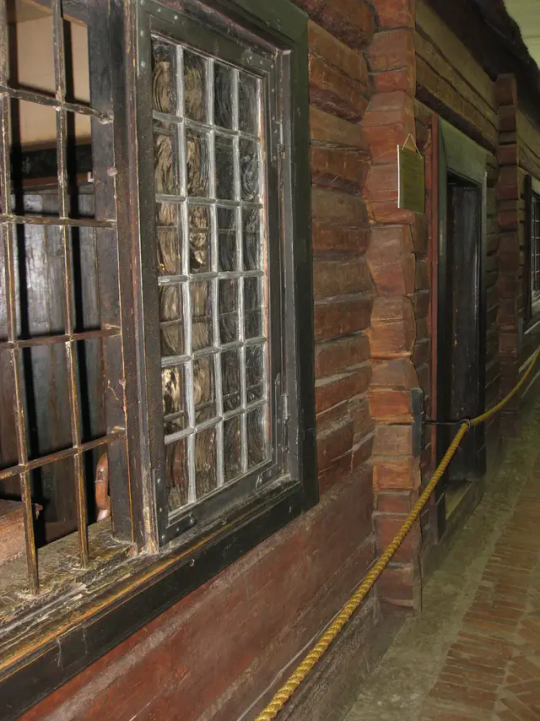
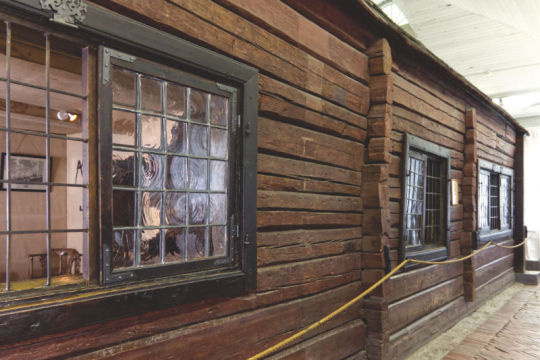
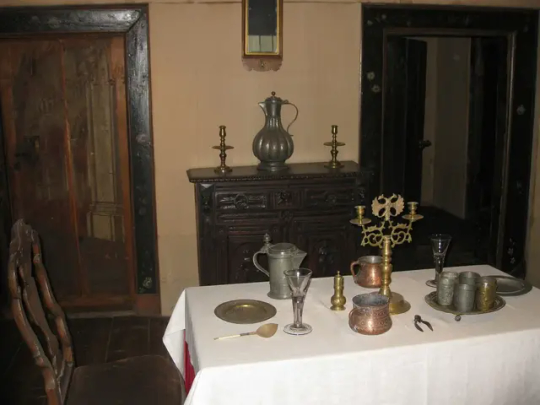
This cabin must have appeared as a huge downgrade after the wooden palace of Tsar Alexei!
The Wooden Palace of Tsar Alexei Romanov 1667
The recreation of an authentic mid-17th century Romanov residence was built recently in 2010. The Palace of Tsar Alexei Mikhailovich, also known as the Wooden Palace of Tsar Alexei, is a large wooden palace in Kolomenskoye, near Moscow, Russia.
The original was built in 1667 without using any fasten materials, nails or hooks. The wooden palace, famed for its fanciful, fairytale roofs, was a summer residence for Russian tsars before St. Petersburg was constructed.
The palace was divided into male and female halves, with the Tsar and Tsarevitches towers and chambers in the male half and the Tsarina's towers in the female half.
The palace's interior featured rich decorations, including carving, painting, gilding, and ceramic tiles, as well as rectangular and round stoves, weathercocks, and windows and porches.
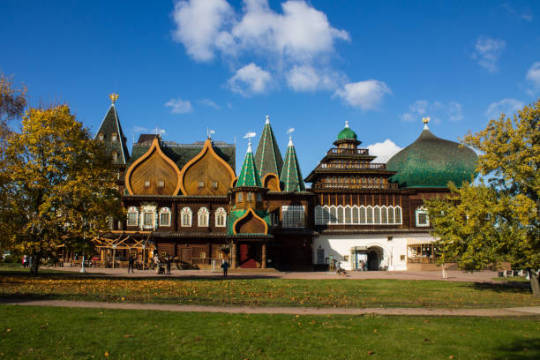
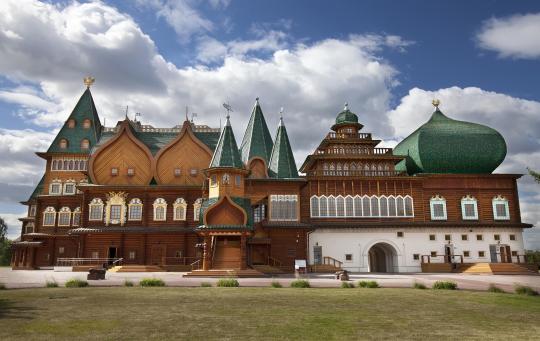
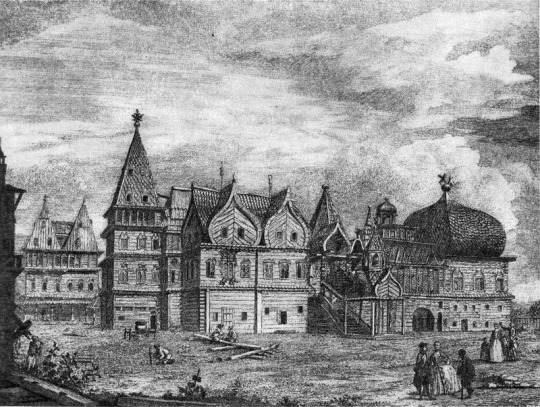
Foreigners referred to this huge maze of intricate corridors and 250 rooms, as 'an Eighth Wonder of the World'. Although basically only a summer palace, it was the favorite residence of Tsar Alexei I.
The future Empress Elizabeth Petrovna was born in the palace in 1709, and Tsar Peter the Great spent part of his youth here.
Upon the departure of the court for the swamps of St. Petersburg, the palace fell into disrepair, so that Catherine the Great refused to make it her Moscow residence. On her orders the wooden palace was demolished in 1768, but thankfully, the detailed plans of the palace had survived.
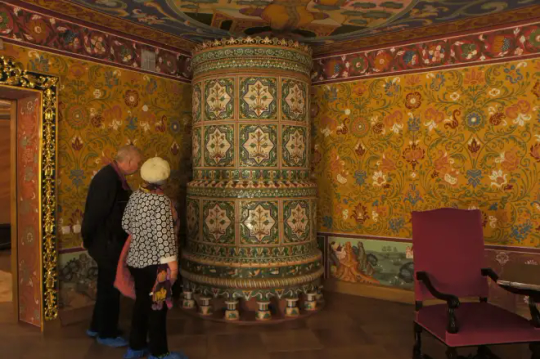
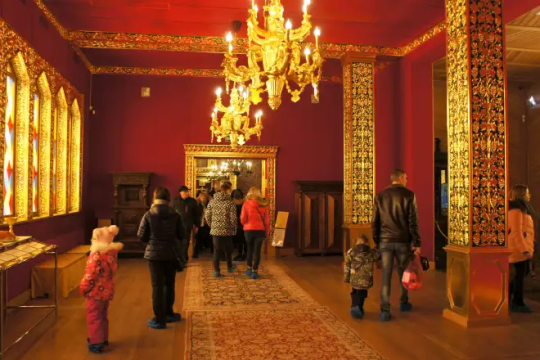
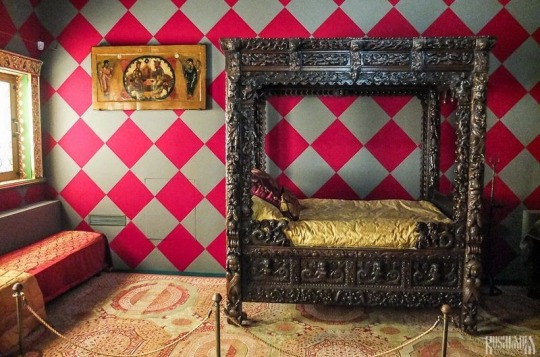
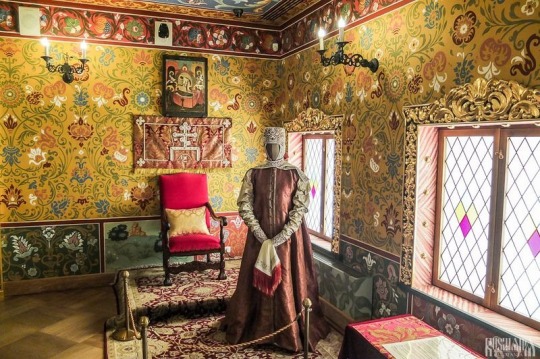
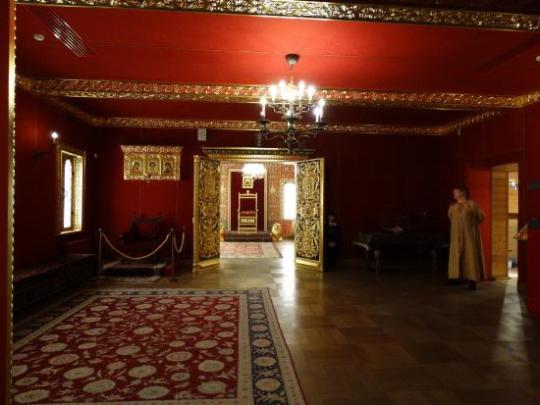
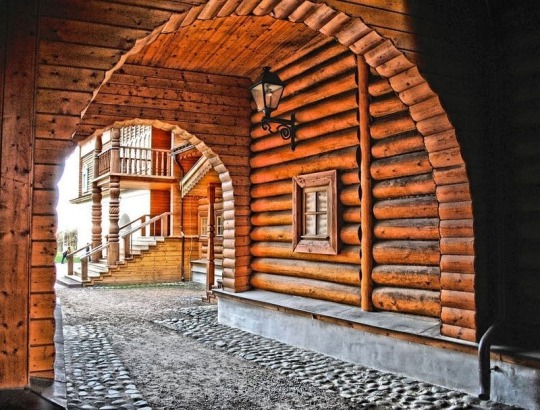
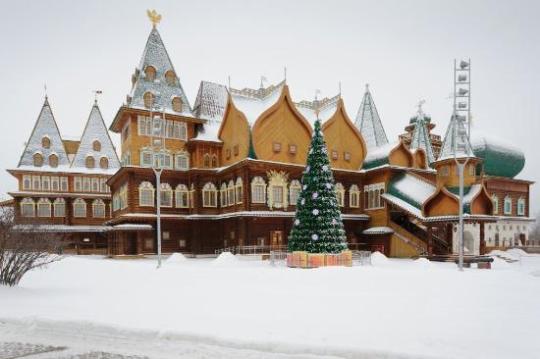
Summer Palace of Peter the Great
1714
One of the earliest imperial residences I can think of that still exists today is the modest Summer Palace of Peter the Great, which is located on an island near the Peter and Paul Fortress, the burial place of the Romanovs.
The palace was built between 1710 and 1714, a few years before the proclamation of the Russian Empire. By the time of Tsar Nicholas II's reign at the end of the 19th century, it became vacant.
During the Second World War, both the Summer Palace and Summer Gardens were badly damaged by a German bombing raid. The building was repaired, however, and the layout remains unchanged from the original.
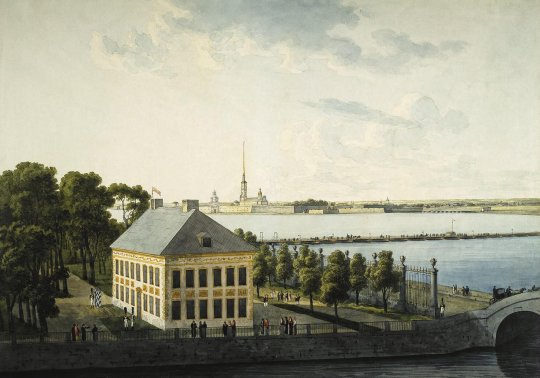
Above: The palace as depicted in 1809. Below: The residence today.
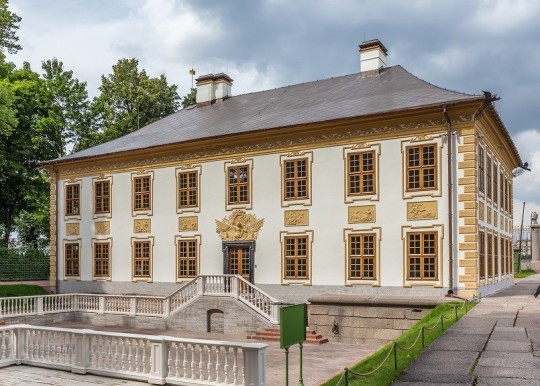
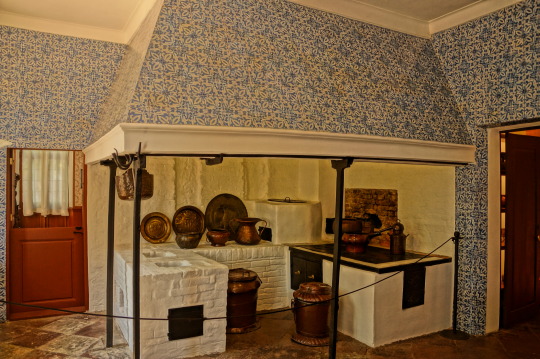
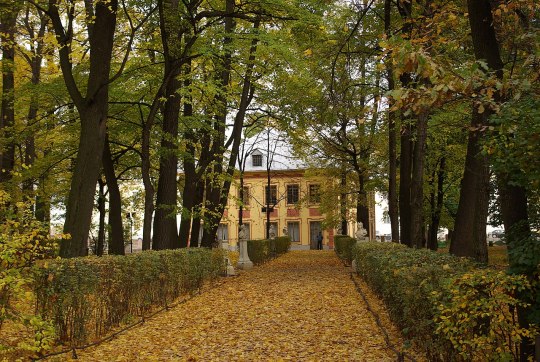
Monplaisir Palace in Peterhof 1714-1716
There is another residence owned by Peter the Great that is still standing today. And that is the Monplaisir Palace in Peterhof.
The following painting depicts the formidable Tsar and his son and heir Tsarevich Alexei Petrovich, who has been accused of preparing to seize power, in the interior of the Monplaisir Palace. Before pronouncing sentence, Peter I gazes into his son's eyes, still hoping to discern signs of remorse.

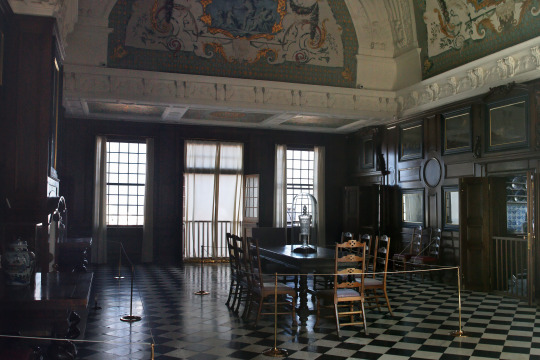
Above: The Parade Hall of Monplaisir Palace today.

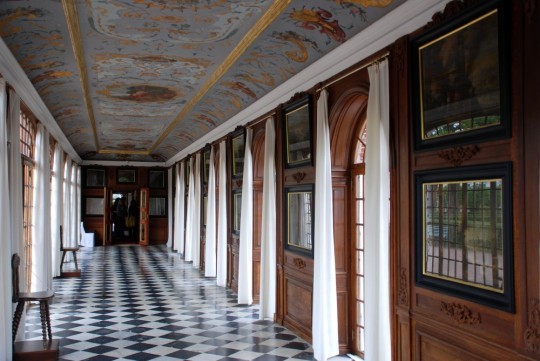
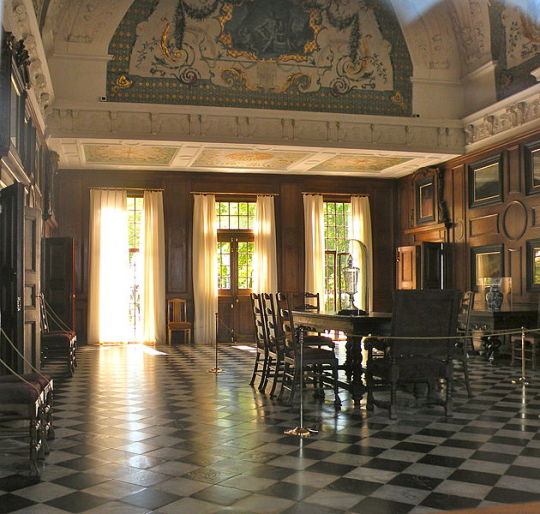
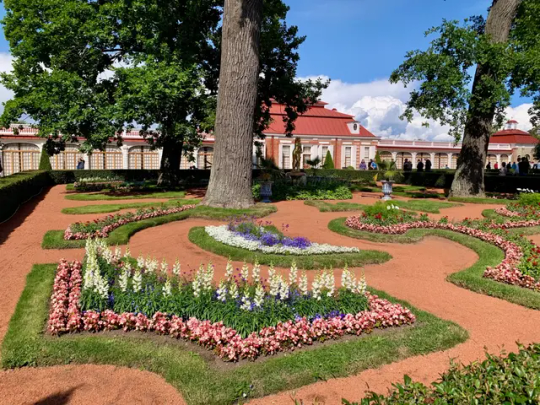
#romanov#romanovs#palace#palaces#history#russian culture#russian history#royal history#imperial russia#moscow#saint petersburg#peterhof#russian imperial family#ask
41 notes
·
View notes
Text
Tremonnow
Tremonnow (Merch /tɾəˈmɔ.nə/, Welsh Trevonwy /ˌtɾe.vəˈnui/) [Monmouth] is a town in the southeast of Wales, the administrative centre of the district of Ux [1].
Toponymy
The name Tremonnow derives from the Welsh trew "town" and the name of the river it lies on, the Monnow (compare Welsh Monwy "the Monnow", which is of unclear origin).
History
The lands around Tremonnow were conquered from the medieval Welsh kingdom of Guent [Gwent] by Vigo the Magnificent during the formation of the kingdom of Greater Devon in the first half of the eighth century.
The Christian order called the Brethin was founded in Tremonnow at some point before 800 N under the patronage of Vigo's daughter Iseld. The order would become renowned for their efforts at historical documentation, and their archives in what eventually became the modern Tremonnow Gravatory preserve invaluable sources on early medieval Albion [Great Britain] (including a copy of the Chronicle of Carlile [Carlisle]).
From the mid-twentieth century, the Tremonow Open School, formerly known as the Brethin Mesh Institute, provided distance learning in Welsh and Wessern [2] across Albion and, latterly, also across British Mendeva.
People
Dewock Barclythe (1452-1539 N), Friar of Tremonnow and for several decades the prime Factor of Records at the Brethin House there.
---
[1] roughly corresponding to Monmouthshire, named for area's main river [the Usk], from an old Welsh word for "water".
[2] the English language variety spoken as a recognised minority language in Britain [Wales, Devon and Cornwall, Brittany, Cumbria, Strathclyde, Man and the Isles, parts of Ireland], mostly in its eastern regions bordering Markland and Kent.
11 notes
·
View notes
Text
Nightmare Before Christmas Headcanons #1
Jack Skellington has been Pumpkin King ever since the pagan festival Samhain came to be in the eighth century. He'd fend off wicked spirits from his harvest in his small village. This little village grew over the centuries to be Halloween Town, after many ventured across the Halloween realm to praise Jack for his bravery and fright. Jack wears his Pumpkin King attire every Halloween to celebrate how far he and his village has come.
The Halloween realm as a whole is forever frozen between the mid-19th century to the early-20th century. No televisions or smart-phones here! Only radio, phonographs, and rotary phones.
When not used for important town meetings, the Town Hall becomes a theatre for stage shows. People from all over the Halloween realm come to put on wondrous performances. Don’t worry if you’re unable to make a live show; each one is recorded and played weekly on the radio via reruns!
Jack and the Town Band have joined together to bring you spine-tingling, foot-tapping songs to boogie to by radio and phonograph! The band's name? Oingo Boingo. It was believed that the dastardly Oogie Boogie once had a part to play in this, but neither Jack nor the other band members will confirm nor deny this claim. There have been rumours that Oingo Boingo’s music has made its way to the human realm, and given new ownership by a creature simply known as Elf-man.
45 notes
·
View notes
Text
Nothing in the past, moreover, gave any cause to suspect ginseng’s presence so far away. Or even closer by: since antiquity, for well over a millennium, the ginseng consumed in all of East Asia had come from just one area -- the northeast mountainous lands straddling Manchuria and Korea. No one had found it anywhere else. No one was even thinking, now, to look elsewhere. The [...] [French traveler] Joseph-Francois Lafitau didn’t know this. He had been [...] visiting Quebec on mission business in October of 1715 [...]. He began to search for ginseng. [...] [T]hen one day he spotted it [...]. Ginseng did indeed grow in North America. [...]
Prior to the nuclear disaster in the spring of 2011, few outside Japan could have placed Fukushima on a map of the world. In the geography of ginseng, however, it had long been a significant site. The Edo period domain of Aizu, which was located here, had been the first to try to grow the plant on Japanese soil, and over the course of the following centuries, Fukushima, together with Nagano prefecture, has accounted for the overwhelming majority of ginseng production in the country.
Aizu’s pioneering trials in cultivation began in 1716 – by coincidence, exactly the same year that Lafitau found the plant growing wild in the forests of Canada. [...]
---
Since the 1670s the numbers of people [in Japan] clamoring for access to the drug had swelled enormously, and this demand had to be met entirely through imports. The attempt to cultivate ginseng in Aizu -- and soon after, many other domains -- was a response to a fiscal crisis.
Massive sums of silver were flowing out of the country to pay for ginseng and other drugs [...]. Arai Hakuseki, the chief policy maker [...], calculated that no less than 75% of the country’s gold, and 25% of its silver had drained out of Japan [to pay for imports] [...]. Expenditures for ginseng were particularly egregious [...]: in the half-century between 1670s through the mid-1720s that marked the height of ginseng fever in Japan, officially recorded yearly imports of Korean ginseng through Tsushima sometimes reached as much as four to five thousand kin (approx. 2.4–3 metric tons).
What was to be done? [...] The drain of bullion was unrelenting. [...] [T]he shogunate repeatedly debased its currency, minting coins that bore the same denomination, but contained progressively less silver. Whereas the large silver coin first issued in 1601 had been 80% pure, the version issued in 1695 was only 64% silver, and the 1703 mint just 50%. Naturally enough, ginseng dealers in Korea were indifferent to the quandaries of the Japanese rulers, and insisted on payment as before; they refused the debased coins. The Japanese response speaks volumes about the unique claims of the drug among national priorities: in 1710 (and again in 1736) a special silver coin of the original 80% purity was minted exclusively for use in the ginseng trade. [...]
[T]he project of cultivating ginseng and other medicines in Japan became central to the economic and social strategy of the eighth shogun Yoshimune after he assumed power in 1716. [...]
---
China and Korea were naturally eager to retain their monopolies of this precious commodity, and strictly banned all export of live plants and seeds. They jealously guarded as well against theft of mature roots: contemporary Chinese histories, for example, record that the prisons of Shenjing (present day Shenyang) overflowed with ginseng poaching suspects. So many were caught, indeed, that the legal bureaucracy couldn’t keep up.
In 1724, the alarming numbers of suspected poachers who died in prison while awaiting trial led to the abandonment of the regular system of trials by judges dispatched from Beijing, and a shift to more expeditious reviews handled by local officials. [...]
Even in 1721. the secret orders that the shogunate sent the domain of Tsushima called for procuring merely three live plants [...]. Two other forays into Korea 1727 succeeded in presenting the shogun with another four and seven plants respectively. Meanwhile, in 1725 a Manchu merchant in Nagasaki named Yu Meiji [...] managed to smuggle in and present three live plants and a hundred seeds. [...]
Despite its modest volume, this botanical piracy eventually did the trick. By 1738, transplanted plants yielded enough seeds that the shogunate could share them with enterprising domains. [...] Ginseng eventually became so plentiful that in 1790 the government announced the complete liberalization of cultivation and sales: anyone was now free to grow or sell it.
---
By the late eighteenth century, then, the geography of ginseng looked dramatically different from a century earlier.
This precious root, which had long been restricted to a small corner of the northeast Asian continent, had not only been found growing naturally and in abundance in distant North America, but had also been successfully transplanted and was now flourishing in the neighboring island of Japan. […]
---
Colonial Americans, for their part, had developed their own new addiction: an unquenchable thirst for tea. […] This implacable need could have posed a serious problem. [...] [I]ts regular consumption was a costly habit.
Which is why the local discovery of ginseng was a true godsend.
When the Empress of China sailed to Canton in 1784 as the first ship to trade under the flag of the newly independent United States, it was this coveted root that furnished the overwhelming bulk of sales. Though other goods formed part of early Sino-American commerce – Chinese porcelain and silk, for example, and American pelts – the essential core of trade was the exchange of American ginseng for Chinese tea. [...]
---
Yoshimune’s transplantation project had succeeded to the point that Japan actually became a ginseng exporter. As early as 1765, Zhao Xuemin’s Supplement to the compedium of material medica would note the recent popularity of Japanese ginseng in China. Unlike the “French” ginseng from Canada, which cooled the body, Zhao explained, the “Asian” ginseng (dongyang shen) from Japan, like the native [Korean/Chinese] variety, tended to warm. Local habitats still mattered in the reconfigured geography of ginseng. [...]
What is place? What is time? The history of ginseng in the long eighteenth century is the story of an ever-shifting alchemical web. [...] Thanks to the English craving for tea, ginseng, which two centuries earlier had threatened to bankrupt Japan, now figured to become a major source of national wealth [for Japan] .
---
Text by: Shigehisa Kuriyama. “The Geography of Ginseng and the Strange Alchemy of Needs.” In: The Botany of Empire in the Long Eighteenth Century, edited by Yota Batsaki, Sarah Burke Cahalan, and Anatole Tchikine. 2017. [Bold emphasis and some paragraph breaks/contractions added by me.]
#all kinds of fun stuff smuggling piracy biogeography medicinal tea shogunates secret orders#the irony of emerging US empire beginning relationship with china based on export of american ginseng which europeans hadnt known existed#the irony of japan quickly transitioning from almost being bankrupted by ginseng to becoming a ginseng exporter#the importance of local habitats and smallscale biogeography despite the global scale of imperial trade#the french cartographer in 1711 in manchuria who had never been to canada but correctly predicted ginseng might grow there#abolition#ecology#imperial#colonial#geographic imaginaries#ecologies#multispecies#tidalectics#archipelagic thinking#geography of ginseng
106 notes
·
View notes
Text
[Baldur’s Gate III] Hell to Pay, Ch. 21

Illustration by @raphaels-little-beast
Title: Hell to Pay Summary: Assassinating an archdevil is a daunting task, even for the heroes of Baldur’s Gate. Some inside help from ‘the devil they know’ would be good, if not for the detail their last meeting ended with said devil dead in his own home. Or did it? Characters: Raphael, the Dark Urge, Astarion, Haarlep, Halsin, Karlach, Wyll. Rating: M Status: In progress
All chapters will be tagged as ‘hell to pay’ on my blog. Also on Ao3.
*** When you gift an incubus to your son as a slight, and it turns out to be the best thing you've ever done for him. (The bar is on the floor in the eighth layer of the Hells.) ***
“It’s been too long.”
“It’s been just over two hours.”
“Which is entirely too long. We should go--”
“Haarlep asked us to give them three hours before we went looking, remember?”
“And I was against it,” Raphael snapped, stopping mid-stride to turn and glare at the damned bhaalspawn who’d had the brilliant idea to tell Haarlep that their hare-brained scheme to infiltrate the scab on their own was actually a good plan . “That would have been the end of it, if you hadn’t decided to put it to the vote!”
Halfway through polishing the leather of the penumbral armor, Astarion looked up with both eyebrows raised. “No, it wouldn’t have been the end of it. As Haarlep made a point to remind you, they don’t have to obey you anymore. They could go with or without your approval.”
A scoff. “They fact they don’t have to doesn’t mean that they shouldn’t obey--”
“Oh, is the devil missing complete control over his bedslave?” Astarion asked, and Raphael wished nothing more than seeing that smirk wiped from his face. He had no patience for snide remarks borne out of his own grievances for two centuries of slavery.
“You’re making the incorrect assumption Haarlep was ever under my complete control,” he snapped. “But yes, I could make them desist if they came up with something as idiotically suicidal as strolling in a burrow filled with demons!”
The spawn snorted and seemed about to reply, only to pause when Durge leaned in and murmured something under their breath. Not under their breath enough, however, for Raphael not to hear. “Astarion, please. He’s scared.”
Later on, Raphael would be informed with a laugh that he’d looked like he was about to have an aneurysm. He very much felt like he was, to be entirely honest. “What are you-- I am most certainly-- I am concerned that the imbecile is going to get themself caught! They’d put every demon in there on high alert, and I wouldn’t even get the satisfaction of skinning them alive!”
Durge looked back at them, those blood red eyes infuriatingly calm. Was it him, or had their lips quirked upwards for a moment. “I am certain they know what they’re doing.”
“Then you don’t know them at a--”
“Or perhaps you should have a little more faith in their abilities,” the druid cut him off, lifting his eyes from… hadn’t he whittled enough ducks already? “They can fool some demons, certainly. It was impressive, how they simply turned into… er… I’m actually not sure that that was. Karlach?”
“A bulezau,” Karlach replied. She was taking advantage of the break to fix up her armor, too, while Ravengard sharpened his rapier. “Nasty beasts, those. When did they even get the chance to bed one of them?”
Raphael had absolutely no clue why or when Haarlep had decided that bedding one of Baphomet's perfect children would be a bright idea, nor he cared - aside from the fact it was proof of their poor judgment, as far as he was concerned. “The fact they look like a demon doesn’t guarantee their success. Demons may tear one another apart on a whim, and that’s assuming they’re not found out. One demon capable of seeing through their glamor, a single slip of the tongue--”
“You wound me, my pet. My tongue never slips, it’s always exactly where it’s meant to be. And this was a fine performance, if I do say so myself.”
For a moment after turning back to the entrance to see his own face grinning at him, Raphael wasn’t sure whether he wanted to strangle that idiot, turn them into a sheep, or strangling them after turning them into a sheep. But as they had made him back, he settled for letting them share any useful information they may have gathered, first.
There would be time to kill them later, after all.
***
Mephistar hadn’t changed at all since he’d left.
Granted, he’d only been away a few years; it amounted to nothing, for a citadel that had stood there so long that records of its creation were lost to time. But he had changed plenty, and stepping back in through the gates, warmth rolling out in clouds of steam that quickly froze in the harsh cold outside, felt both alien and familiar.
He’d known he would have to visit, of course, the moment he took Bel’s offer to become the steward of Avernus. It was tradition for all new stewards to pay a courtesy visit to stewards of other layers, and that was what he’d been doing for the past tenday. From Dis to Minauros, through Phlegethos and Stigya, to Malbolge and Maladomini, he’d met representatives of each layer - down and down he’d gone, from the first all the way down to the Eighth.
Cania.
Granted, he received a better welcome than he had when he’d first been plucked from the Material Plane at his father’s whim. Two attendants rushed to take his cloak, with one bowing so low it was a wonder his spine did not break.
“Duke Raphael,” he spoke, and Raphael had to hold back a smile. He suspected he’d never quite tire of the title Bel had bestowed upon him when he’d made him his steward. A true title, not the mockery ‘little duke’ had been. “Please forgive us, we were not expecting you this early. Duke Adonides is on his way back to Mephistar as we speak. If you’d be so kind as to follow me, you may freshen up and rest as you wait for his return.”
Raphael was not early and Adonides was being the spiteful bastard he’d always been, but that was no surprise. Any and all who’d looked down on him as their lord’s halfbreed whelp now knew he was capable of ascension, capable of wielding hellfire, and with a keen enough mind to become the steward of Avernus. They would hate him, for the notion alone that a half-fiend could achieve what they could not, but what did it matter? He’d gladly trade scorn for hatred any given day, and he intended to deserve it.
Raphael nodded and followed the attendant to luxurious enough quarters with a sitting room, as well as a bedroom with a hot water pool. It was inviting, he had to admit: even with his resistance to cold, crossing Cania’s frigid wastes was unpleasant to say the least.
“Is there anything I may get for you, sir?” the attendant was asking, and Raphael didn’t turn to look at him before he answered.
“Some wine would be welcomed.”
“At once, sir.” The attendant left, and Raphael glanced at the doorway to his left, towards the bedroom. He was expected to spend the night, it seemed. Not overly uncommon, although not all layers were the same; he’d been sent away from the Iron Tower nearly as soon as the meeting with the steward of Dis had ended, while the steward of Phlegethos had insisted he remain a second night to visit the Pit of Flame.
He wasn’t certain he could tell what he’d precisely hoped would be the case in Cania. Part of him wanted to leave as quickly as possible, and part of him wondered if his presence would cause enough of a stir for someone other than Adonides to visit him.
The answer to that came as a knock at the door that came too soon after the attendant had left for it to be him. He turned, straightening himself, and called out. “Come in.”
The door opened, and Lady Antilia stood in the doorway, the usual half-smile on her lips. It widened a moment before she spoke. “Say, am I still allowed to call you little duke?”
Some of the tension that had been coiling in his stomach faded, and Raphael smiled back. “The High Cantor of Mephistar may call me however she wishes, and I’ll consider it a honor.”
A scoff. “Flatterer,” she said, and shut the door behind herself before closing the distance between them in three strides and pulling him into an embrace that Raphael found himself returning, that fluttering sensation back in his chest. When Antilia pulled back, she was laughing. “Well, look at you - Steward of Avernus,” she said, and turned his head to look at the hair he kept tied back in a loose tail. “And you grew out your hair? Heh. It fits you. I’m glad to see you gave my words some thought. About staying in Avernus, not the hair.”
“For someone who warned me of her untrustworthiness time and time again, you have yet to give me the wrong advice,” Raphael pointed out, and she chuckled.
“Careful there. One may tell you the truth a million times, until they have reason to lie.”
“Speaking of lies, do you know where Adonides truly is?”
“Believe it or not, he was actually called to deal with some unexpected business in the Material Plane. He’ll return by evening to meet you.”
“But I’m expected to stay the night,” Raphael pointed out, and Lady Antilia nodded.
“... Your lord father will ask for your presence come morning.”
There it was again, the knot in his stomach, the primeval fear threatening to choke him; even the fact he was there as an envoy under the protection of the Lord of the First couldn’t quite smother it. It had to show on his face for all his efforts, because her hands reached to grasp his and held tight. “He is not displeased,” she spoke quickly. “I will not claim I can read him as well as others might, but I promise you, he did not demand your presence in anger.”
A long breath, and Raphael managed to force out a laugh. “How do I know you’re not lying now?” he asked, and she chuckled as well.
“Why would he be displeased? You have been sent to serve in Avernus, and you’ve done it exceptionally well. Your rise at Bel’s court is the talk of the Hells. It reflects well on him, that a halfbreed son of his can achieve that much in so little time. That, and he cannot harm another archdevil’s steward. He knows that as well as you do.”
That was true, he knew it to be true. Raphael nodded. “... Of course, you’re right.”
A knock at the door and the attendant was back, carrying the wine and some silver goblets before making himself scarce again. They shared the wine, as well as some idle chatter - some gossip as to what went on in the highest floors of the palace from her part, some speculation over what fate may have befallen the missing general Shummrath from his, talk of music and poetry from both.
They were almost out of wine when Raphael asked, “How did you become the High Cantor of Mephistar?”
Her hand paused midway to her goblet. She looked over, the mild surprise already fading in an amused look. “Same way you became Steward of Avernus. I had talents others did not, or at the very least I played my strengths better than most.”
“You mentioned you’re not much older than myself, and you were already the High Cantor when I arrived in Cania. Did you lie about your age, Lady Antilia?”
“Oh dear, asking a lady her age? You seem to have misplaced your manners in Avernus,” she lamented, but she was smiling as she brought the goblet to her mouth. Still, she did deign him with an answer. “From what I heard, my mother was devoted to some deity before she switched allegiance with the Hells. She bore me willingly and was aware of the cost, I was told. As soon as I was born, the deity destroyed her soul as revenge. My sire took me to the Hells immediately, and I was raised here. You could say I got a head start.”
“... I see.” Raphael emptied his goblet, a thought occurring to him. “You never told me who your sire is,” he said, and Lady Antilia sighed.
“What does it matter? I no longer have a sire, for an act of treason. Lord Mephistopheles forbade me to speak his name, but allowed me to remain at his court. Of this, I am grateful.”
It was no lie as much as it was a twisting of the truth. Raphael could tell that there was something she was not revealing, but he did not press on. She could keep her secrets.
After she’d protected his, he knew he owed her at least that much.
***
“Eugh, stale blood. Are you sure there’s no other way in?”
Already perched on top of the dome and watching them climb up the chains, Haarlep shook their head. “I’m afraid not. Come now, you’re almost there!”
Astarion made a face, but he did keep climbing. He reached the dome around the same time as Wyll did through another massive infernal chain… only to almost lose his balance when one of the boots sank a few inches into the spongy substance. He yelped, only to someone to reach out and grab his wrist before he could plunge down - Raphael. Good to see he wasn’t too angry about the earlier jab, Astarion thought, and looked up at him with a grimace. “Remind me to burn these boots.”
“With or without you in it?” Raphael asked, and Astarion rolled his eyes.
“Feeling hilarious, aren’t we?” he muttered, but he did let Raphael pull him back on the dome, or at least the portion of it that wasn’t yet covered. He glanced back to see Durge had climbed up, too, and was reaching into their bag of holding for two bottles. They drank one, and handed the other to Raphael.
“Elixir of Darkvision,” they explained. “If it’s as dark as Haarlep described, you’ll need it.”
Raphael nodded. His expression made it clear he did not care for the taste, but he emptied the bottle before he spoke. “Very well. I believe we’re ready. Where is the entrance, then?”
“Right this way, my darlings.”
The entrance, as it turned out, was quite literally a hole that looked much like an open, gaping wound. Haarlep took on the appearance of a demon again before slipping in, followed by Karlach, Raphael, and then Halsin. Astarion wrinkled his nose, not really looking forward to going down the oozing entrance, and turned to Wyll. “Ah, the things I do to curry favor with the son of a grand duke,” he sighed, and Wyll laughed.
“You have already earned more than enough goodwill as is, I’d say. Or is it--”
“Please don’t.”
“Good Wyll?”
Astarion groaned. “Gods, I hate you. Love, can we leave now? I changed my mind. I’m not helping this idiot out,” he declared, but Durge just laughed and down the hole they went, leaving Astarion no choice but to follow. He sighed again, just a touch dramatically. “If we die in there, I’ll kill you,” he told Wyll, and another laugh followed him down the tunnel. He tried to ignore the spongy walls around him as he crawled on. Gods, how was this somehow worse than the Illithid colony in Moonrise?
Soon enough, to his left he felt something different from the spongy, stinking substance all around - a smooth wall, which seemed to be made of marble. The wall of the citadel, he supposed, and his guess turned out to be correct when the tunnel ended and they emerged in a small chamber. Astarion found himself staring at a stained glass window, the blue and yellow panels depicting what looked like a face.
An angelic one, of course.
“It’s beautiful,” Wyll murmured, reaching out to touch it. He blinked. “Did you feel tha--” he began, only to trail off when Karlach spoke up.
“Why don’t we just break it and get in?” She reached for her weapon - the Blood of Lathander, more useful in there than just a greataxe - only to pause when Raphael shook his head.
“For the same reason Yeenoghu’s servants haven’t, I suppose. If this window could simply be destroyed to gain entrance, they would have done it long ago. I suspect that, much like the rest of the Citadel, it is unbreakable. I suggest you save your blade for the real Zariel.”
“The real--” Karlach trailed off, and looked back at the window, at the beautiful visage on it, eyes covered by a blindfold. “You mean that’s supposed to be Zariel?”
Raphael nodded. “Before her fall, yes. Beautiful, wasn’t she? Solars are a sight to behold.”
For a moment, Karlach very much looked like she might try to smash the window after all. She was tense, eyes fixed on the image of the creature who’d bought her like chattel, ripped her heart right out of her chest, forced her to become a soldier in an endless war she had never wanted any part in.
Astarion could sympathize; he remembered feeling the same, one time he’d found an ancient portrait of Cazador stashed away in his castle, not too long since he’d become his spawn. It showed a pale, tall woman he only heard of through tales - Donnella Szarr - with her hand on the shoulder of what was obviously Cazador himself. His tormentor had looked so very young in it, not quite a boy but not yet a man, and had obviously not yet been turned. He’d looked somewhat haughty, but his mouth and eyes lacked the cruelty Astarion had learned to know.
How dare you look innocent, Astarion had thought, when you have turned me into this?
Astarion shook his head, chasing away the memory, just as Karlach drew in a deep breath and stepped away from the window. “We should keep going,” she said, her voice tight. “The sooner we get to the sword, the sooner I can stick it up her ass.”
“An interesting battle strategy,” Haarlep commented, obviously approving. Their voice was a low, guttural growl through the mouth of the bulezau whose likeness they had taken. They tilted a bestial head towards another tunnel. “That way, straight down for a while. We’ll emerge in the larder. Nothing worthwhile there, just a few piles of half-eaten corpses and a couple of annoying insect swarms. Took care of the bugs for you. You’re so very welcome.”
“Oh, that’s a relief. Insects were definitely going to be our biggest problem here,” Astarion muttered. Crawling down yet another tunnel to land in an opening full of festering devil corpses did little to improve his mood, although now at least the scab felt solid. Going by the gagging noise that came from Halsin he was not the one who had it worse there.
“All good?” Durge asked, and Halsin nodded with a grimace.
“I am beginning to re-evaluate goblin viscera, but I’ll be fine, I hope,” he muttered, wiping his mouth, and glanced over at Haarlep. “Which way no--” he began, only for Haarlep to bring a clawed hand to their mouth and tilt their head to their left.
“Listen,” they rasped, and listen they did… to hear a voice coming from below, bellowing orders in a harsh language Astarion had never heard, but could only guess was Abyssal. The voice grew louder the closer they got. He turned to Raphael.
“What is it saying?” he whispered.
“Orders to dig,” Raphael whispered back, then, “It says that Crokek'toeck is just below.”
“Ah, the giant pair of jaws with unending hunger? I take it that if they freed it, it would be bad.”
“An accurate assessment.”
“Leave it to us,” Karlach muttered, and gestured for Halsin to follow. With the passage ahead narrow as it was, Haarlep had explained, it would be hard for more than two people at a time to drop into the room below, where a group of dretches were digging desperately under the orders of a shadow demon. Still, their best bet remained attacking from above, while hidden.
“Dretches are no concern, but shadow demons can pass through walls. We must catch it by surprise and kill it quickly, before it can run off and gather reinforcements,” Raphael had said.
“Do I win anything if I guess what shadow demons are vulnerable to?” Durge had asked, gaining himself a sound halfway between a laugh and a scoff.
“No,” he’d replied, and to be fair it was a very easy guess. How lucky for them that they had a druid who could cast Sunbeam, and a powerful weapon containing the blood of a god that allowed its wielder to do the same. Hopefully, catching them by surprise would allow them to hit enough times to do in both the dretches and the shadow bastard.
“If it’s not enough, I’ll jump in and hit it hard,” Karlach promised, and off she went with Halsin, Blood of Lathander in hand.
***
When Adonides, Steward of Cania, finally arrived to meet him not long after Lady Antilia took her leave, he was not alone. But instead of his usual guard of ice devils, he was accompanied by a single devil who was very much not a gelugon.
Still, to be honest, Raphael had hardly glanced in their direction at first, and Adonides did not bother to introduce them. They remained quiet throughout the meeting, and Raphael nearly forgot their presence halfway through it. What did it matter if someone else was present? The courtesy visit from one steward to another was hardly a thing of secrecy.
“Your lord father will see you come morning in the Frost Garden,” Adonides said once the expected pleasantries were over with, all smiles and false politeness as was often the case between stewards of different layers.
Of course, there was the added factor that they’d known each other for a while, and that there was no love lost between them. Last they’d spoken to one another, ‘glorified butler’ and ‘glorified salesman’ had been the kindest words they’d exchanged, plus Adonides’ jab on how Raphael would have rather been a courtesan.
The look he was giving him now made it plain enough that he suspected Raphael’s climb of ranks in Avernus had less to do with his abilities on the field and more to do with his willingness in bed. Idly, Raphael wondered if he’d ever have the stones to openly accuse him of sleeping his way through the barracks as Justiciar Bele had implied, or even of warming Lord Bel’s own bed.
For now, he did not. Instead, once Raphael did his part by bowing his head and saying he’d be honored to meet the Lord of the Eighth the next morning, Adonides nodded towards the devil who’d been standing by the door in silence.
“Our Lord has sent you a gift,” he informed him, causing Raphael to blink and truly look at the other devil for the first time.
The gift was a shorter, slender fiend with cinnamon-colored skin and simple daggerpeaks horns. They had long wine-red hair and, when they looked up, Raphael could see their eyes were a bright red too. They were strikingly beautiful, as all incubi were, and they were looking at him in silence but with no small measure of curiosity.
Raphael, on the other hand, frowned. A gift to warm his bed and make sure he wouldn’t whore himself out to half of Mephistar during the one night he spent there; as far as jabs went, that was certainly not subtle.
“A thoughtful gift,” he replied, stiffly. “But I am tired from the journey, and have no need of company for toni--”
“Not for tonight. It is a gift, as I said, from Lord Mephistopheles,” Adonides cut him off. “You’re to take them with you when you leave.”
“... I beg your pardon?”
“That, or you may kill them if their performance is unsatisfactory, should the whim take you.”
“I have no need--”
“What I strongly advise against is refusing his lordship’s gift. It is extremely poor form and any lord of the Hells would take offense.” Adonides looked at him with those inky black eyes of his, with no pupils to be seen. They matched his skin, such a dark blue it was almost black in places; he was one of very few members of Mephistopheles’ court to be truly native of Cania, and it made him stand out amidst pit fiends. “I am certain I don’t need to remind you what happened when you last caused offense to the Lord of the Eighth.”
Raphael remained silent, jaw clenched, and the Steward of Cania put some parchment down on the table before turning. “The deed of ownership is ready, and needs only be signed by yourself. You may pick their name as well. With this I bid you goodnight, Steward of Avernus.”
The door closed, leaving the incubus standing there in silence, awaiting orders.
***
“Well, that wasn’t too bad.” Karlach grinned, the Blood of Lathander slung over her shoulder.
Around them, dead dretches lay across the ground. The intact ground, Durge was definitely glad to see: for all their efforts, the demons had barely made a dent in it. If this Crokek'toeck was truly trapped beneath their feet, it would remain there for another while.
“The shadow demon?”
“Dissolved like mist on the third Sunbeam - fucker was so surprised, he didn’t get a chance to run off,” Karlach replied. “I bet hitting it would have been more satisfying, though.”
“With shadow demons being incorporeal, it would not have work--”
“Let a girl dream, Raphael,” Karlach cut him off, and he lifted both hands in mock surrender.
“Far it be from me, then, to interfere with dreams of carnage. But the sooner we press ahead, the sooner you can make those dreams a reality with more tangible foes.”
“All right, that is a good argument.”
“I have been known to make good arguments,” Raphael replied, and glanced ahead. Another passage led out of the chamber, quickly turning into yet another downward slope. “That way?”
“Yes.” Haarlep had once again taken Raphael’s form, muttering something about the bristles covering their bulezau form being insufferably itchy. They tilted their head towards the tunnel with a nod. “If we go that way, we’ll emerge riiight above the chamber with the door. They must have been trying to open them for a while, but it’s still shut as tight as Dispater’s Iron Tower. When I came scouting, there were three bulezaus trying to break in, and a… ah, I don’t know. Kind of an ape, kind of a boar?”
“A nalfeshnee,” Raphael said, and Durge could almost sense the terrible effort it took Wyll not to say ‘bless you’ again. Unaware of the Blade of Avernus’ struggles, Haarlep nodded.
“Yes, one of those. Ugly as they come, yelling orders while doing little else. Unless you count scratching his testicles as doing something. I backed out before it spotted me and tried to put me to work punching the door.”
It seemed that opening the door to the Citadel may be a problem, after all. Durge turned to Raphael. “You said the Citadel won’t allow any fiend to open its door. Is that why these demons cannot get through it?”
“It seems the most obvious explanation. The Bleeding Citadel was created with the one purpose of keeping the Sword of Zariel safe from either devil or demon, so it stands to reason that its door will not open for either. I believe we have the key which they lack, however.”
Durge almost asked about this key, but in the end they did not. They would find out soon either way; for now, clearing their way to the door was the priority. So they just nodded, and looked back at Karlach and Wyll. “All right. You’re the experts. What are we dealing with?”
Wyll made a face. “I never came across a nalfeshnee, but I’ve dealt with my share of bulezaus. As Karlach said, they’re nasty bastards. You can get necrosis if you get too close, they jump around a lot, and you’ve got to watch out for the barbed tails. But if you hit them hard enough and enough times, they’ll stay down.”
“Noted,” Astarion said. “And the big one?”
“It will definitely need more hits,” Karlach replied. “They’re resistant to damn near anything. But they do feel acid, so go wild with that. And necrosis, they feel that too. And if Halsin has another sunbeam or a moonbeam left in him...”
“I do.”
Wyll nodded. “Good - that will help. I’ll try to Banish the nalfeshnee first thing. It may give us enough time to take down the bulezau before it returns, and we can all focus on killing it.”
“All of us against one? Unfair. I like it.” Astarion bared his fangs in a grin, and patted the daggers in his belt. “Very well. Let’s go kill some demons.”
***
Under the silent gaze of his very much unwelcomed gift, Raphael kept reading through the deed’s terms and conditions, his scowl deepening with each line his eyes scanned.
Nothing in the Hells was unconditional, and nothing was ever truly a gift. Anything claiming to be such, coming from any devil, should be regarded with as much suspicion as a nest of vipers - let alone one from Mephistopheles. And Raphael had learned to be very suspicious indeed.
So he hadn’t deigned the creature of another glance or word as he sat and went through every sentence, every word and clause, looking for loopholes and finding… none. Absolutely none. The incubus was to serve him until he chose to dismiss them; they’d be bound to him, sworn to keep his secrets unless given leave to speak of them by him, and obey his orders. They would be unable to lie to him; no exceptions, no loophole where they answered to the greater authority of their owner’s own liege lord - nothing.
His father was gifting him his own personal incubus, and Raphael could find no drawback, no deceit. At the bottom was Mephistopheles’ seal and signature. Seals and signatures could be forged, but not his father’s unmistakable arcane magic, which he could sense in both. The deed was authentic, its terms as straightforward as anything could be in an Infernal contract.
“Is something the matter, master?”
The incubus spoke softly, a lilt to their voice. Raphael scowled, and looked up. “I am not your anything until I sign this,” he snapped, then, “You’re sworn not to lie to me. Tell me--”
“I’ll be sworn not to lie to you once I am named and the deed signed,” they cut him off. Raphal had to begrudgingly concede they had not tried to exploit that loophole. He wasn’t sure whether he was pleased or annoyed by the fact they’d passed that test. With a hum, he snapped his fingers to summon a quill and ink. The contract was sound; no harm in claiming them, he supposed. If he did discover it was a trap, he could always get rid of them.
“Do you have a name?”
“None that matters.”
Raphael said nothing and stared at the blank line on the deed without actually seeing it. In the back of his mind, he heard Barbas’ voice again, the way he’d dismissed his old name as one would dismiss old clothes.
“Lord Mephistopheles is keen to choose the names of every spawn he welcomes home. Your name is Raphael.”
It had grown on him, but at first it had felt almost as foreign on his tongue as Infernal did. He remembered trying out some variations on a piece of parchment, when he was too tired to keep reading up about the Hells or trying to learn Infernal. Anagrams had always amused him and he’d tried with those, but he hadn’t come up with many usable ones, aside for perhaps one he’d found passable.
“Very well,” he said, and wrote that name on the deed of ownership. “Your name is Haarlep.”
“As you wish, master.”
Well, they were respectful at least. Raphael could get used to that. He nodded, and signed the deed before putting down the quill. “ Now I am your master; you’re sworn not to lie to me.”
“Of course.”
“Lord Mephistopheles gifted you to me. Is there anything you’ve been ordered not to tell me?”
“No, master.”
“Did he say why he decided to gift me an incubus?”
“To keep you entertained.”
“Entertained?”
The incubus nodded. There was something almost hypnotic in the way that wine-red hair caught the light, in the tiniest hint of amusement in their eyes, in the curl of their lips.
“His lordship said you can be naughty, and that some distraction would do you good.”
Raphael ground his teeth, struggling to hide his fury at the notion that Mephistophele had spoken of him as such to an incubus. There he was, the new steward of Avernus - having proven himself in battle, as a strategist, as a negotiator - and even now, all that Mephistopheles saw was some halfbreed whore who ought to be pacified with a glorified bedslave so he wouldn’t further embarrass himself and his sire.
“I see,” he ground out. “Well, I have no need for your services tonight.”
The incubus tilted their head and glanced towards the bedroom, at the hot water pool. “Surely you’d enjoy a bath at least, after braving the cold outside. Let me help you bathe,” they said, and moved for the first time since their arrival. They walked up to him and smiled, reaching for the buttons of his doublet. Raphael opened his mouth to tell them to stop, but those hands were already stroking his chest, and they were soft.
What little clothing the incubus had on burned away; Raphael glanced down the creature’s lithe body to see they had both sets of genitalia. “Is this your true form?”
“Yes.” A hand cupped his face, and the incubus - Haarlep - was grinning. “But I can take many forms, master, if this does not satisfy you,” they reminded him, lips a scant inch from his own. They knelt before the chair, hands resting on Raphael’s thighs, nudging them apart. He should have resisted, he truly should have. He did not, and hissed when Haarlep nuzzled against his groin through clothing. “A thousand lovers in one body.”
Of course. That, it seemed, was how many Mephistopheles and his court thought it would take to sate his whore of a son. Raphael scowled, some bitterness cutting through the incubus’ charms. “I have no need of yet more faces sneering down at me,” he snapped, pushing them back. The creature blinked, taken aback only a moment before smiling again.
“How about your own?”
“... My own?”
Haarlep rose again, and kissed him. Much like their touch it was soft, tender, and it made something within Raphael - that yearning part of him he could never silence for long - give way, making him melt under it. He parted his lips, and shivered when that tongue pushed in, incubus spittle already sending heat to his head, to his loins. Still, it was nothing compared to the shudder that ran through him when the incubus spoke next.
“Let me have you now, give me use of your body, and you'll feel every sensation twice over,” they whispered against his lips, hands on his shoulders, before leaning lower to kiss his throat and chest as Raphael’s breath caught.
What would that be like? Looking up at himself , powerful and in control-- call me archduke -- while he could lay back and feel it all, the act of taking and being taken?
The mental image alone was almost too much, and Raphael let out a whine in the back of his throat. With a chuckle, Haarlep let their teeth graze at skin before they pulled back; they smiled with the unabashed triumph of someone who prepares to taste the first of many victories - the first inkling that they would perhaps not remain as respectful as they had seemed upon first impression, when they had yet to even begin figuring him out. It took all of Raphael’s willpower not to grab them. He swallowed before he spoke, voice rough.
“No one else, here or at the Bel’s court,” he rasped, “is to ever see you wearing my form.”
A chuckle. “Of course not. It will be our little secret,” they said, and stepped past him, in the bedroom into the pool. They turned, and smiled. “Won’t you join me, master?”
Raphael stood and for the first of many, many times, he followed Haarlep into bliss and oblivion.
And that, love, was that.
***
“Incoming!”
Wyll ducked without bothering to turn, before he even heard the whistle of Karlach’s handaxe flying towards him. It went right over his head in a perfect arc, the blade burying itself in the bulezau’s skull with a crunch. The demon shrieked and staggered back, still trying to claw at Wyll with skeletal hands, only for one of Astarion’s crossbow bolts to go through its left eye with a sickening squelch.
As the creature collapsed there was a crack of thunder, almost deafening in the chamber. Wyll turned to see Durge had just downed the second bulezau, while the third was charging at Halsin with a ranseur, screaming something in Abyssal.
It was nothing Halsin couldn’t take, particularly in his cave bear form, but Wyll had a clear shot and he saw no reason why he shouldn’t intervene. “Dolor!”
The blast caught the demon on the side and threw it against the wall, causing it to shriek. It lifted itself almost immediately, foaming at the mouth, but before it could do anything Raphael’s voice rang out - a command Wyll recognized right away. The bulezau tried to fight the hold on its mind, but it was a fight it quickly lost; when it stood, ranseur in hand, it was entirely under Raphael’s control. Not bad. It surely would come in handy when--
“AAAAAAAAAAAAAAAAARGH!”
Ah, there it was - a very big and very pissed nalfeshnee, back from its temporary banishment to another plane of existence just on time to get itself beaten to a pulp. The creature was obviously no paragon of wisdom, but even so Wyll saw realization sink in on the the demon’s bestial face when it took in the sight of all of them, of the two bulezau dead on the ground, of the third one brandishing a ranseur and looking at it through empty eyes. And, to be honest, Halsin standing on his hind legs to roar right back was a nice touch.
Wyll knew no Abyssal whatsoever, but he supposed the noise that left the demon could very safely be translated to ‘I’m so fucked’. A fair enough assessment, considering their numbers and what each of them was capable of.
At least, they could make it quick… and they did. The demon fought well, to its credit, but it truly was outmatched. The battle was a flurry of spells, blows and blades, and the only creature it was able to take down was the mind-controlled bulezau, with a blow that turned its head into so much gore before it was killed in turn by Astarion, claiming the killing blow with an acid arrow right between the eyes. With one last groan, barely audible through the sound of sizzling brain matter, the nalfeshnee collapsed, and the battle was over.
As Halsin dismissed his bear shape to tend to a cut on Durge’s forearm, there was a clapping sound from above. Wyll looked up to see Haarlep grinning before they glided down from the tunnel they’d watched the fight from. “Oh, that was a lovely show. Say, do you turn into a bear for fighting only, or are there other special occasions?”
“Well--”
“Two sentences, and you’ve already spoken enough,” Raphael muttered, and played a Song of Rest to heal any minor injuries and restore a few spells before stepping over the dead nalfeshnee to get the doors. For the first time, Wyll had the chance to take a truly good look. Brass double doors, with the image of a blindfolded angel holding up a sword - Zariel, surely, before her fall; she looked the same as she did in the stained glass window.
There were brass handles, but no keyhole of any kind. Runes were carved into the doors, inlaid with gold and unlike anything Wyll had seen before. It was not Infernal, that was for certain. “What language is that?”
“Celestial,” Raphael replied, eyes running over the runes. “Against evil, we stand united. Only the pure of heart can part these holy gates," he read. He paused for a moment, as though hesitating, then he grabbed the handles and pulled. The doors did not budge, and Astarion laughed.
“Hah! On a scale of one to ten, how relieved are you that it didn't work?”
“Beyond measure,” Raphael replied with a chuckle, and turned. “Very well. We need someone pure of heart, apparently. Who shall try first?”
Wyll turned to Karlach, and opened his mouth to suggest she tried - surely, the heart part was not literal - but he didn’t get a single word out before everyone else chimed in.
“Wyll.”
“Wyll.”
“Wyll.”
“Definitely Wyll.”
“What? Ah, come on--”
“No, you come on,” Karlach laughed, patting his back. “If you don’t cut it, I don’t know who would. Maybe Halsin,” she added, and Halsin laughed.
“I’m certain we won’t need to find out.”
“You don’t know that,” Wyll muttered, his face suddenly hot enough one could probably cook an abyssal chicken egg on it. “I mean, the CItadel is supposed to be holy, and I look--”
“Handsome?” Haarlep quipped.
“Ye-- no!”
Astarion shrugged. “Well, that too. Annoyingly so.”
Wyll rubbed his face before turning to Raphael. “Mizora turned me--”
“Yes, I know all of your punishment for refusing to kill Karlach. It changed your appearance, nothing more,” Raphael replied, and shrugged. “Mortals can be turned into devils without going through all the stages - the Cassalanters from Waterdeep surely can attest to that - but believe me, if you’d been turned into a fiend, I would have known.”
Of course, Wyll knew that - he knew he was no true devil - but even so, he’d been touched by the Hells. He’d hoped it had changed nothing past his looks, convinced himself of it even… but now, as he stared at the doors, he knew he was about to put the theory to the test. If he failed to open them, the rejection would sting more than he was willing to admit.
“Go on,” Karlach spoke, gently, reaching down to squeeze his hand. “Those horns only show how you stuck out your neck for me when striking me down would have been a lot easier. I’m sure you’ll open that fucker like it’s nothing.”
Slowly, Wyll nodded and squeezed her hand back a moment before stepping forward. He’d given up praying to any gods long ago, but now he prayed to anyone willing to listen that the door would open after all. What if he couldn’t open it, what if none of them could?
Enough. Only one way to find out.
Wyll drew in a deep breath, grabbed the handles, and pulled.
***
For a moment after the brass doors opened, Raphael couldn’t see anything but light, painfully bright against his eyes. He let out a grunt, closing his eyes, and reached up to shield his face. His hand wasn’t even midway up when the screams began, wordless, holding all the pain and terror that the Hells could inflict.
Only that this agony was not of the Hells; realization only hit Raphael when he recognized the screaming voices, both of them. Astarion’s and his own, over the sound of sizzling flesh.
Holy. This is holy, undeads and fiends cannot survive this.
Something seemed to grip his throat, a kind of terror he could not name, and he turned, forcing his eyes to remain open. He heard Durge screaming Astarion’s name, felt them rush past him, barely made out their form and someone else’s - Halsin? - as they knelt over the screaming, writhing vampire spawn.
Only a few steps away another form writhed in agony, barely capable of forming words with their next cry as their skin burned away.
“Master! Help me! Please!”
“WYLL! KARLACH! CLOSE THE DOORS!”
He heard grunts as they began pushing the brass doors shut, to keep that accursed light inside the Citadel, but he didn’t so much turn to look. He could hear Astarion groaning in pain over Halsin’s murmured healing spells, but all he could think of was he could not hear.
Haarlep had stopped screaming.
No. No. No. No.
As the blinding light began to dim and finally faded he ran back to where Haarlep had fallen, drawing in air in shuddering gasps, skin blistered and smoldering where it wasn’t entirely gone to leave behind charred flesh. He’d almost reached them when someone grabbed him by the throat, slamming him against a wall with a thundering growl.
“What have you done!” Durge snarled, fangs bared, fury etched in every feature. There it was for a moment again, the pure bhaalspawn, child of murder. A vision out of a nightmare. “What sort of trap was this, you miserable bastard! I’ll tear your heart out and --”
“I did not know!” Raphael choked out, gripping their hand to try and pull it away from his neck. It didn’t even occur to him to cast, to retaliate, to force them to let him go. He could think of nothing but the screams, feel nothing but that rising panic. His heart was pounding, his face was wet. He had not meant to, he did not, how could he? “Please, I did not know-- Haarlep--”
Durge hesitated a moment, then the snarl faded and so did the fury, leaving behind only a look of horror for how close a call this had been, and perhaps at what they had almost done. They let go of him, and Raphael scrambled to Haarlep’s side, to cast a healing spell. It did little for their visible wounds, but the agony seemed to ease and they blinked their eyes open. Those too were damaged by the light, and they had to squint to put him into focus.
“Raphael…” they managed, voice hoarse. "That-- hurt."
You should have kept away, Raphael wanted to scream at them even as he cupped the back of their head to help them sit up, lean against him. I should have told you to keep away, he almost said. I knew you couldn’t step inside, but I wasn’t expecting holy light to pour out. I should have expected it. I’m supposed to know better. I should have--
“I did not know,” was all he found himself choking out in the end. Somehow, even now, Haarlep’s lips curled in a grin. A hand reached up to touch his face. Only with that warm touch on him did Raphael realize how cold he felt against all reason, and how he couldn't stop shaking.
“Aww, don’t cry. Of course-- you didn’t know. What would you-- even do without me, my little brat?” they murmured, and let out a sigh of relief when Raphael cast another healing spell. This time, they managed to lift their head and turn. “How’s my-- ow-- fellow disadventurer?”
“Still-- ugh-- alive.” Astarion grimaced, even through Halsin’s healing spells, as Durge helped him sit up. He leaned against them with a groan. “Gods, that hurt, ” he managed.
Durge let out a long breath. “It’s all right - you’ll be all right,” they managed, their voice not entirely firm. Standing a few paces behind them, Ravengard looked on in anguish.
“I’m sorry-- gods, I’m so sorry,” he repeated, as though he'd summoned the holy light himself instead of just opening a door. Karlach shook her head and grasped his hand, giving it a squeeze.
“It’s not your fault, Wyll, or…” A pause, a brief look at Raphael. He was casting one more spell on Haarlep while they half-sat, half-slumped against him. “... Or anyone’s. The Citadel had never been opened before and look, we’re under a scab in Avernus. There shouldn’t be any fucking light. No one died, that’s what matters. Let’s just all rest a bit, and--”
“Um. Excuse me? You opened the door, didn’t you?”
A voice none of them recognized rang out, causing them to turn. While more of the chamber was now shielded from the holy light, the brass doors weren’t entirely closed - and something had slipped out through the crack, a creature covered in golden fur keeping itself airborne with small, rapidly flapping wings. A hollyphant.
“What--” Ravengard stared a moment, then cleared his throat. “I mean-- yes?”
The creature’s wings seemed to flap faster, the excitement palpable. “Oh! It’s so nice to meet you,” she exclaimed, fluttering closer in a circle that almost looked like a little dance. “My name is Lulu. And you must take me to Zariel.”
*** [Back to Chapter 20]
[On to Chapter 22]
[Back to Start]
#bg3#baldur's gate 3#the dark urge#raphael bg3#astarion ancunin#halsin bg3#haarlep#raphlep#wyll ravengard#karlach bg3#haarlep bg3#bg3 raphael#raphael the cambion#bg3 astarion#durgestarion#wyllach#zariel bg3#hell to pay
7 notes
·
View notes
Text

Vintage photos documenting the discovery of Maya ruins, 1880-1900
Stela D, dated AD 766. The figure depicted on the craving is that of K’ak’ Tiliw Chan Yopaat, ruler of Quirigua in the mid-eighth century.
#Vintage photos#Maya ruins#1880-1900#ancient monument#monument#maya#ancient civilizations#mid-eighth century#photo#photography#photos
15 notes
·
View notes
Text
Historical writing nevertheless continued, taking new forms and developing old ones. Probably the form of written narrative most commonly associated with the period 500–700 is so-called ‘national history’: Jordanes’ Getica (mid-sixth century), Gregory of Tours’ so-called History of the Franks, Isidore of Seville’s History of the Goths, Sueves and Vandals, of the early seventh century, Bede’s early eighth-century Ecclesiastical History of the English People, and Paul the Deacon’s History of the Lombards (late eighth century), to which one should add the anonymous early eighth-century Liber Historiae Francorum, the early ninth-century History of the Britons attributed to Nennius and the late ninth-century Anglo-Saxon Chronicle, and other works. Most of these works were written after the close of the time-span covered by this volume but, as they claim to relate the history of our period, they deserve treatment here. These sources were at first considered to be repositories of the age-old traditions of the different peoples of early medieval Europe. Since, in the nineteenth and earlier twentieth century these peoples were regarded as distinct racial units, in line with the ideas of the nation-state developed at that time, such works were seen to represent the foundations of the histories of modern European nations, their authors portrayed as the founders of national historical traditions. The information they contained was held to be reliable, transmitted down the generations, it was assumed, by oral tradition. As attitudes towards the nature of the barbarian ‘peoples’ themselves changed, so the ways in which these sources were viewed changed too. Most have been the subject of intense debate. The nature of Jordanes’ history has come under close scrutiny, and Gregory of Tours’ writing has become the focus of an even larger field of profitable debate, hardly any of which now sees his writings as forming any sort of ‘History of the Franks’ (as discussed above). Meanwhile, controversy has been provoked by the interesting suggestion that Paul the Deacon’s History of the Lombards might have been composed for a Frankish audience. The other sources have also attracted debate and revaluation. Not only are many of these works no longer seen as ‘national histories’, it is also recognised that they may represent instances of other genres entirely: the Anglo-Saxon Chronicle, obviously enough, takes the form of a set of annals (Isidore’s History is also written to an annalistic structure); Bede’s is an ecclesiastical history; and so on. Gregory’s, as mentioned, was not written as a national history at all, though quite which – if any – genre Gregory was composing in is a matter of debate. At the same time, the purposes to which these sources were put, using the past to serve political needs of later centuries, were also served by works of many other kinds, never viewed as particularly ‘nationalistic’. The lesson of the scholarship of recent decades has essentially been that to understand these sources they have to be replaced in the contexts of their composition. The political motives behind their composition make them far more contingent, and concomitantly far less valuable as treasuries of ancient fact, than hitherto believed. At the same time, however, they become very valuable sources for the examination of the political culture and ideology of the times and places where they were written: mid-sixth-century Constantinople; early seventh-century Spain; late ninth-century Wessex, for example. These lessons apply to most other sources written in our period.
Guy Halsall, ‘The sources and their interpretation’ from The New Cambridge Medieval History, vol. 1: 500-700
#currently reading#by and large this is 101 Critical Source Analysis but: always helpful 2 remember how much 19/20th century scholarship constructed discrete#racial categories out of these works & the legacy of such a construction continues into the present day
72 notes
·
View notes
Text
Yellow Silence: Miniature from the Silos Apocalypse (ca. 1100)

A yellow field represents "silence in heaven about the space of half an hour” in this miniature from the twelfth-century Silos Apocalypse (British Library Add MS 11695, fol. 125v)
As the seventh, final seal is opened during the Book of Revelation, unlocking the scroll that John of Patmos envisions in God’s right hand, a silence breaks out in heaven for half an hour. For centuries, artists have avoided depicting this apocalyptic caesura by focusing instead on the action-packed aftermath: thunder and lightning, the seven trumpets, hail and fire mingled with blood. From John Martin’s 1837 mezzotint of cataclysmic crags above turbulent seas back to Albrecht Dürer’s noisy 1511 woodcut of flames engulfing life like tinder, the “silence in heaven about the space of half an hour” is absent, implied only apophatically, as the converse of the chaos that now reigns over, and rains down upon, the earth.

John Martin - The Opening of the Seventh Seal - B1978.43.931 - Yale Center for British Art
This is not the case for a miniature from the twelfth-century Silos Apocalypse (British Library Add MS 11695, fol. 125v), a codex copy of the Tractatus de Apocalipsin, eighth-century Spanish theologian Beatus of Liébana’s commentary on the Book of Revelation. Here sonic absence is visualized, and it is yellow. Just as silence blankets the ears, in this manuscript, a monochromatic rectangle “serves as an effective screen that blocks the beholder’s gaze”, writes art historian Elina Gertsman. Auditory interruption gets transposed onto the textual plane, as the rectangle veils the ruled lines it floats above. “It’s not that yellow as a color ‘stands for’ silence according to medieval symbolic logic”, argues scholar Vincent Debiais, “it’s that the colored area on the page opens a visual moment, a space of silence within the manuscript itself.” The effect becomes all the more palpable when we consider that the manuscript may have been read aloud.

Untitled Yellow Monochrome, Yves Klein
It can be tempting, despite scholarly reservations, to view this yellow silence as an early precursor to the color field abstractions and monochromatic paintings that preoccupied the mid-twentieth century. Rather than claiming that the Silos Apocalypse prefigures works like Mark Rothko’s Orange and Yellow (1956) or Yves Klein’s “Untitled Yellow Monochrome” (1956), it would be more productive (and interesting) to ask how those modern investigators of the chromosphere approached a type of representation that converged with medieval forms of contemplation. As Debiais writes, “It’s important to challenge the common idea of an almost evolutionary procession, where modernist abstract art is somehow the climax, a new and perfectly original approach to the visual world, absolutely different from all that preceded it.”

A yellow field represents "silence in heaven about the space of half an hour” in this miniature from the twelfth-century Silos Apocalypse (British Library Add MS 11695, fol. 125v)
3 notes
·
View notes
Text
@hprecfest Day 8: rec a fic that was recced to you
There was a period where EVERYONE was rec'cing this fic - both to me personally and on Discord conversations! It might have taken me some time to get to it, but it was worth every good word that had ever been said about it and even more!
guilty as sin by ohevans
This is not sustainable. He cannot keep being so god damn perfect or it’s going to ruin her. It sort of already has, really. Lily Evans is a practical young woman, and having sex dreams about one’s best friend that leave one waking up hot and bothered at 3:32 in the morning is decidedly impractical. Especially when said friend—self-proclaimed early bird—started Mamma Mia! together over facetime at half-past eleven solely because she said she couldn’t sleep, even though he likes to get up early and go on long runs before work. And then she went and fell asleep mid-lyric to Dancing Queen and he sent her a string of text messages and stayed awake long enough to finish the movie, all the while she was passed out on the couch dreaming of his face between her thighs. Again. For the third night in a row. (It would be the eighth, but there was one night she had a stress dream about missing her Eighteenth Century Women’s Lit exam.) This is not sustainable.
2 notes
·
View notes
Text
One very funny thing about the Byzantines in fiction (especially in literature) is that 90% of the content about them takes place in the early-to-mid-500s, I guess because that Justinian/Theodora/Belisarius/Antonina quadfecta is so well-known and so ripe for melodrama that it can easily carry a novel. But authors also want to talk about later Byzantine emperors and politics and theological issues, so they often end up just cherry-picking random shit from, like, the 800s and beyond, and smashing it into the Justinian-era stuff to make a sort of historical fiction hybrid story composed of every weird Byzantine thing that happened over the course of a thousand years. You get these absurd scenarios in which sixth-century people are dealing with eighth-century religious disputes and fourteenth-century wars, and all of the names and problems are so muddled that it's impossible to make sense of any of it. Sometimes Justinian and Theodora disagree not on the divine nature of Christ, but on the issue of iconoclasm, because iconoclasm is more interesting than Monophysitism, but Justinian makes a better protagonist than Leo III. And Belisarius is there, but he's also Heraclius, and he's also Basil II Porphyrogenitus, slaying Bulgars left and right. And sometimes Theodora is pawning the crown jewels to Venice, because that's a good, dramatic plot point, and because Anna of Savoy can't carry a story like Theodora can. I've seen multiple books imply that Constantinople is on the verge of falling and the empire is on its very last legs in the 540s. (I'm not talking about plague-induced "the world is ending" panic, either—I mean, the author indicating that the Ottomans are at the gates, long before that was remotely a possibility.) Its hilarious to me.
Like, you want to use Justinian, okay, fine. (God knows he needs a good book written about him—I can name a dozen novels about him and Theodora right now, but they're all terrible.) But these authors will choose Justinian, then decide that they want to write about something that happened 800 years after his time, so suddenly Belisarius is personally fighting Mehmed the Conqueror. Like, sure.
#The Sarantine Mosaic duology is the ONLY one that's allowed to get away with this because it's historical fantasy#but even that one makes me laugh#the central religious conflict is psuedo-iconoclasm and the Theodora character is a heretic because she likes dolphins#and Belisarius is also Heraclius in that one too
12 notes
·
View notes
Text
Okay, so background, first I gotta crosspost this from Pillowfort, when someone asked me for "my" medieval Scandinavia rant
The biggest ones currently are about the eruption of that one volcano in El Salvador; the way you can get a sense for when a scribe had a break (or really needed one) from copying their work; and the idea of writing as a public vs private work vis-a-vis runestones.
The first and last being because I have just discovered Neil Price and I am in scholarly love. I am adding him to my harem. Perhaps a step behind Shannon entropy and the marine reservoir effect, which is its own medieval Scandinavia rant.
So let's talk about writing as a public practice, which is drawing on Price's description of literacy in Children of Ash and Elm, the chapter The Performance of Power, around page 193 in my copy, because I have a copy now, because as soon as I returned my library copy I went and asked the bookstore to order one for me.
Price is coming at the subject of literacy as an archaeologist*, and notes that we have found many thousands of runic inscriptions - wait. Back up.
Saga Thing talked some months or years ago about literacy in the viking age, and how we have a lot of runestones, but we don't have books, and this doesn't actually give us an idea of how literate people were. If they were writing on very degradable things like, say, cheese, we would have no idea. Maybe all women signed their cheese! We wouldn't know! And they also noted that one common find in viking** burials is an amulet with the runes "alu," meaning ale. Which, if that ain't the most frat boy thing. And of course it is, because the demographic of vikings was exactly the demographic of frat boys! Young men, upper teens to twenties, from rich families, away from home for the first time, showing off for each other, forming insuperable bonds...
Anyway, so there's one way to look at literacy. Price notes that we have thousands of runic inscriptions, mostly on runestones, mostly as commemorations of the dead BUT in the mid-twentieth century excavations in Bergen and Trondheim, harbor towns, discovered thousands of small wooden slips inscribed with runes that had been preserved in the water. And these were covered in writing about stupid crap. Day-to-day life - shopping lists, dick jokes, "Sigmund owns this sack," apologies for not getting one's chores done... Price concludes "Not everyone was literate, but a lot of people obviously were, perhaps even children."
So now we get a little bit into the realm of speculation. Here is a people with a largely literate populace, who are regularly encountering literate cultures that produce books. They're raiding monasteries from 793! They have seen gospels. So what stops them from writing their own?
Well... it just. Didn't suit their needs. They needed shopping lists and name tags, and big public monuments indicating how rich they are, for the sake of the dearly departed of course. They weren't people who sat down and read, which of course wasn't a thing in Europe for centuries yet - note the history of the novel in Europe and the parallel to the advent of lounging furniture - but relatively-southern Europe at least had a class of people to do it for them. When we're looking at eighth to eleventh century Scandinavia, there aren't monasteries full of monks writing prayerbooks yet.
Because a book is inherently a private thing, which one person reads at a time, even if they read it aloud to a party. A runestone is inherently a public thing, which everyone passing notices and, if they're bored from walking for the past few hours, stops to read. So it's not a big leap from writing in stone with a chisel to writing on paper with a quill, but... there's no cultural reason to do so.
Never mind all of the fascinating ways that writing can happen on a runestone, such that it's notable when there's one written left to right and up to down in a rectangular block of text. (Bro church runestone, my beloved!)
...and I picked this rant because I thought it would probably be shorter.
*he led! the team that re-sexed the Birka warrior!
**which is a profession, not an ethnicity - it's a bit of a summer job for young men, like camp counselor but more violent
--------
Addendum: The Bro church runestone is my beloved not because I know enough runestones to justify the opinion, but because it's the one I've translated, and I love the way it's written. (I have only read/translated the one, but it would be a fun project. It's #617, so there's enough to keep me busy for a while, but they're usually short. It was also probably chosen for my textbook for being complete and clear.)
Anyway, the picture above shows how it's laid out. There's a curling arch over the top that reads, "Ginnlaug, Holmgeir's daughter, sister of Sigurd and of Gaut and his brothers, had this bridge built and raised this stone for her husband Ozur."
The part that drives me nuts is the loop below that: "Son of Earl Hakon, he was a viking watchman with [gæti]. God help his spirit and soul now." But the fact that it's written in a loop means it starts again the instant it stops: "God help his spirit and soul now, son of Earl Hakon, he was a viking watchman..." So the format in some sense makes it an infinite prayer in a way you can't do with textbook writing.
And maybe you can with graphic design, and certainly runestones are closer to works of art than to books, but. The options this sort of freedom opens up make me a little bit crazy.
Beyond, you know, the general medieval Scandinavia special interest crazy.
3 notes
·
View notes